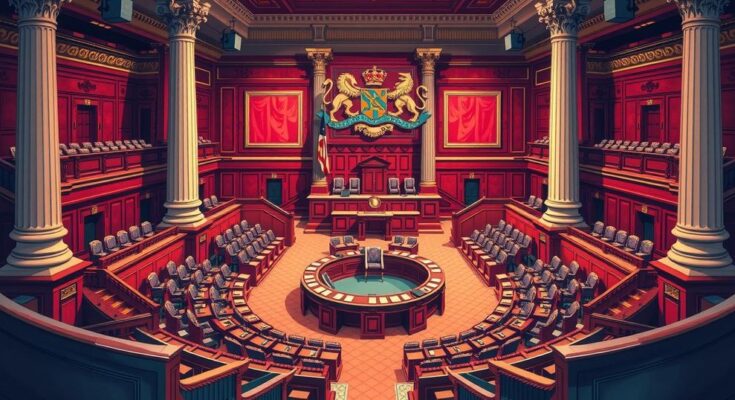Portugal’s Prime Minister Luís Montenegro is set to lose a confidence vote, likely leading to elections in May. His government has faced scrutiny over business dealings, prompting an opposition inquiry. The political landscape is shifting as the Socialists gain support, while the far-right Chega party grapples with its own scandals.
Portugal is on the brink of fresh elections as Prime Minister Luís Montenegro’s government faces a vote of confidence that is expected to end in defeat. This scenario could lead to Portugal’s third general election in just three years. The anticipated outcome indicates a majority of Members of Parliament will vote against his right-of-centre minority government.
Although President Marcelo Rebelo de Sousa can choose not to dissolve the assembly, he has indicated he would do so if the government fails on Tuesday, paving the way for elections likely scheduled for May. The confidence vote was initiated by Montenegro’s own government amidst opposition Socialists’ plans for a parliamentary inquiry into his business dealings.
Criticism has been directed toward Montenegro for his management of Spinumviva, a company he founded, which reportedly continued to receive substantial payments even after he became the leader of the opposition in 2022. Concerns have been raised about the legality of transferring business ownership to family members, particularly regarding the joint asset nature of their marriage.
The opposition has also questioned the transparency of the company’s income sources, which until recently included payments from Solverde, a hotel and casino group involved in a gambling concession review. Montenegro maintains that Spinumviva offers consultancy services related to data privacy laws while outsourcing tasks to external specialists, yet these claims have sparked further scrutiny from the Bar Association regarding the legality of such services.
In an attempt to regain favor, Montenegro’s cabinet has approved several measures to showcase its commitment to the country. Meanwhile, the far-right Chega party, which is the third-largest in parliament, seems poised for an opportunity to criticize political corruption, especially following scandals involving its own MPs.
Despite having previously led in opinion polls, Montenegro’s coalition is now trailing the Socialists, led by Pedro Nuno Santos, who has refused to support any confidence motion for the government. Given the political climate, none of the major parties are eager for snap elections, yet the environment suggests that May elections are inevitable as Montenegro opts to appeal to voters rather than face an inquiry.
In summary, Portugal is likely headed for fresh elections in May following a confidence vote that is expected to topple Prime Minister Luís Montenegro’s government. Amidst allegations concerning his business dealings and increasing pressure from the opposition, Montenegro’s government faces significant challenges. With the rise of the Socialists in the polls and potential scandals in the Chega party, the political landscape is precarious as parties navigate through public sentiment and the call for accountability.
Original Source: www.bbc.com




